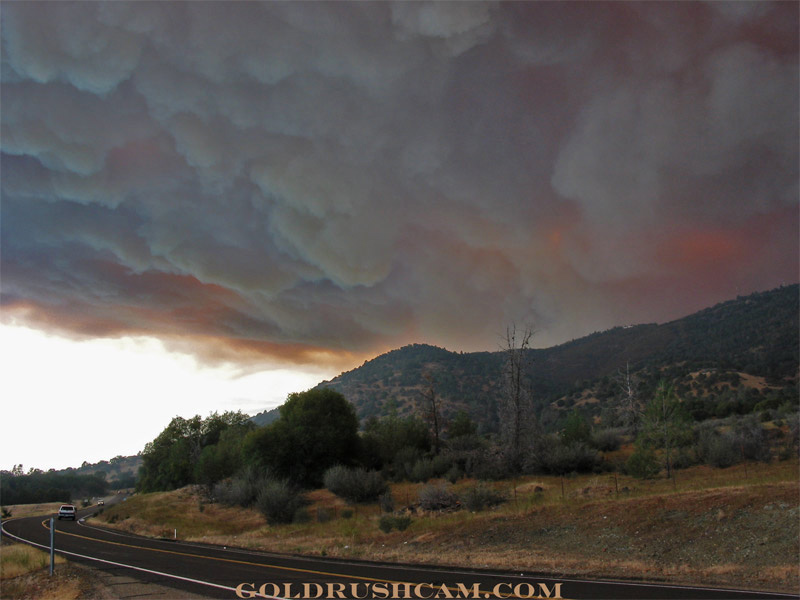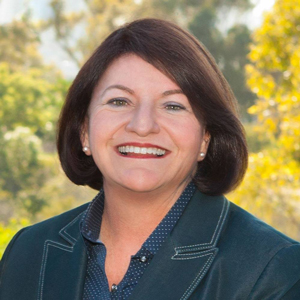
2008 Telegraph Fire in Mariposa County
Sierra Sun Times file photo
February 13, 2020 - SACRAMENTO – On Wednesday, Senate President pro Tempore Toni G. Atkins (D-San Diego) announced a series of hearings to  develop a comprehensive Wildfire and Climate Action Plan. Two hearings were held in November and January by the Senate Committee on Energy, Utilities and Communications, and the next hearing is scheduled for Wednesday, Feb. 12 at 1:30 p.m. (Room 112) by the Senate Insurance Committee. In addition, a series of bills will be introduced as part of the Action Plan.
develop a comprehensive Wildfire and Climate Action Plan. Two hearings were held in November and January by the Senate Committee on Energy, Utilities and Communications, and the next hearing is scheduled for Wednesday, Feb. 12 at 1:30 p.m. (Room 112) by the Senate Insurance Committee. In addition, a series of bills will be introduced as part of the Action Plan.
(Left) Senate President pro Tempore Toni G. Atkins (D-San Diego)
“We are committed to a comprehensive, effective action plan to move us forward,” Atkins said. “We must continue to hold utilities accountable, advance solutions to stabilize the residential insurance market, continue our leadership and track record on climate change, and provide communities and small businesses with the tools they need to combat climate change.”
Over the next 90 days, the Senate will hold a series of hearings to bolster the work that began in Senate committee hearings late last year and in early 2020.
The Senate Energy, Utilities and Communications Committee held an important hearing in November 2019 to review the application of public safety power shutoffs (PSPS) during the fires that happened earlier in the Fall. That was the first hearing held by the Senate, and another followed it in early January on telecommunications issues. The committee will follow up with a look ahead on PSPS investment and improvements, including how to avoid PSPS going forward, future utility governance options, and potential California Public Utilities Commission reforms.
“The gross mismanagement of this past year’s PSPS events has made Californians rightfully doubt the reliability of their power and telecommunications services, which are a lifeline for so many, especially during emergency events,” Senator Ben Hueso (D-San Diego) said. “In continuing our oversight efforts by evaluating additional policy or regulatory oversight to strengthen our service networks, we aim to prevent and limit the occurrence and impact of future outages, while restoring consumers’ trust in these services. Furthermore and of utmost importance, we will continue to hold utilities accountable and ensure they continue to make progress towards reducing the risk of wildfires caused by their equipment.”
In addition, the Senate Budget Sub-Committee #2 on Resources, Environmental Protection, Energy and Transportation will identify resources needed for grid modernization, hardening, vegetation management, and fire prevention. The Senate Insurance Committee will review residential insurance issues, including non-renewals, while the Senate Natural Resources and Water Committee will hold a series of hearings on the cost of the climate emergency and potential solutions.
“Budget Sub-Committee #2 will build on its work to expand investments and resources in wildfire prevention with an increased focus on hardening and modernizing the grid, and reducing the fuel load that feeds these fires. As we work to confront climate change, we will conduct hearings on the Public Utility Commission, CalFIRE, California Conservation Corps, and other relevant departments to identify resources needed to increase accountability and effectiveness for these critical actions,” Senator Bob Wieckowski (D-Fremont) said.
“Our priority is to keep Californians safe and to ensure they have access to homeowners coverage at an affordable price. We must also take ambitious steps to reduce the frequency and intensity of wildfires and the damage they cause. This year, we are focusing on expanding access, keeping the industry accountable, engaging local municipalities, and educating our residents on how to protect their homes. I look forward to working with the Insurance Commissioner and stakeholders to put forward thoughtful proposals that will protect our most vulnerable communities,” Senator Susan Rubio (D-Baldwin Park) said.
“Thousands of Californians have lost everything to the climate emergency in recent years. If we don’t stop building deeper into risky fire areas, and if we fail to make major investments in hardening communities and preventing disasters before they start, California will fail this trial by fire. Pro Tem Atkins and our working group recognize the stakes are too high not to act boldly now,” Senator Henry Stern (D-Canoga Park) said.
Senate Leader Atkins created two working groups to focus on energy market and insurance stability and wildfire response and resiliency. The working groups have been meeting since Fall 2019. The first working group – Energy and Insurance Stability Group – focused on energy market and insurance stability. The second working group – Wildfire Response and Resiliency – focused on state and community-level wildfire response and resiliency and forest health strategies.
“Led by Pro Tem Atkins, the Senate’s Action Plan will be one of the boldest in America. The plan is focused on keeping Californians safe, holding utilities accountable and advancing innovative solutions to some of our toughest challenges. Our goal is to protect residents from the growing climate crisis and the threat of wildfire, and to help stabilize our energy and residential insurance markets,” Senator Mike McGuire (D-Healdsburg) said.
“Nearly every Californian has been affected in some way by the threat of deadly wildfires facing our state due to the climate crisis. In this unprecedented moment in our history, we must do everything we can to protect our communities by working to prevent these horrific fires before they start. The Wildfire Response and Resiliency Working Group is pursuing meaningful policies to achieve this goal by reducing wildfire fuels, building fire-resilient communities, and strengthening emergency planning and response. Fire prevention and emergency response must be a top priority for lawmakers this year because our state’s future is at stake,” Senator Hannah-Beth Jackson (D-Santa Barbara) said.
One of the first policy actions taken by the Senate is the passage of Senate Bill 45 – the Wildfire Prevention, Safe Drinking Water, Drought Preparation, and Flood Protection Bond Act of 2020 – in a significant effort to fight the effects of climate change and wildfires.
“We must take the long view of the climate crisis, planning and funding our efforts well into the future to protect our communities. I am grateful to the Senate for their quick action on SB 45 and look forward to working with the Assembly and the Governor to begin making meaningful investments in resiliency and adaptation,” Senator Ben Allen (D-Santa Monica) said.
As part of the Action Plan, Senators will introduce legislation to accomplish the following goals:
- Fast-track electric grid hardening, modernization and reliability and vegetation management.
- Implement public safety power shutoff strategies to avoid another catastrophic year.
- Develop home and community hardening strategies to keep Californians safe.
- Address homeowner insurance non-renewals and stabilize California’s home insurance market.
- Reduce fire risks around neighborhoods to protect people and property.
- Improve community land use planning and emergency preparedness.
- Train and deploy a resiliency workforce.
![]() Senate Action Plan to Address the Growing Climate Emergency (PDF)
Senate Action Plan to Address the Growing Climate Emergency (PDF)
Source: CA. Senate Democrats
